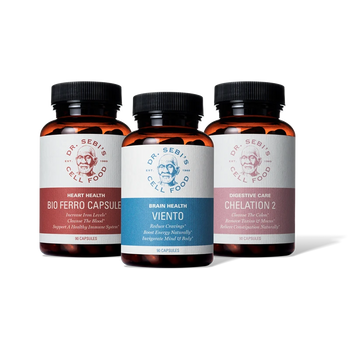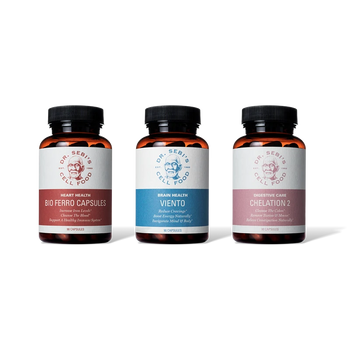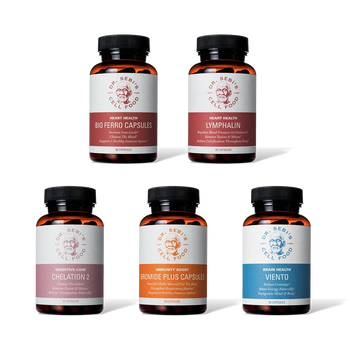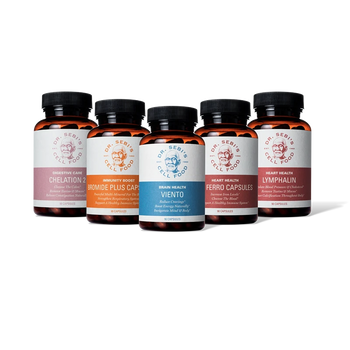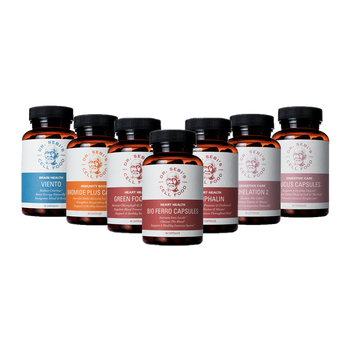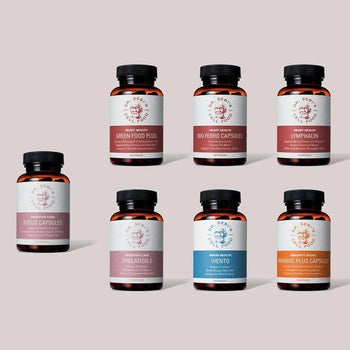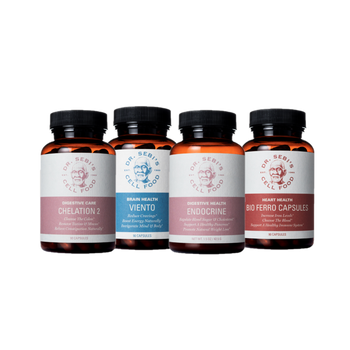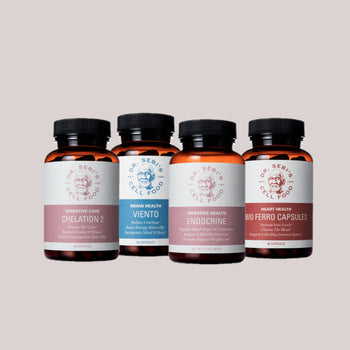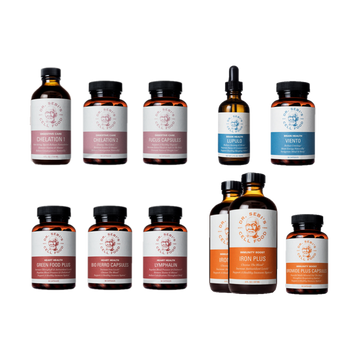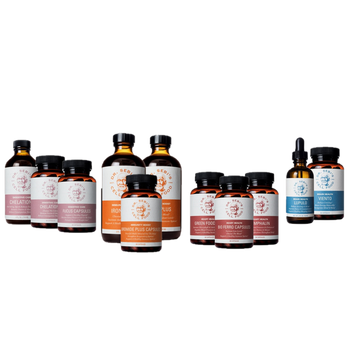Mucus buildup can make you feel sluggish, congested, and uncomfortable—so why keep eating foods that fuel it? Though your body naturally produces some mucus to trap harmful particles, too much can block your airways, disrupt your digestive system, and contribute to chronic conditions like asthma and heart disease.
Certain foods promote inflammation and increase mucus production, leaving you feeling weighed down and unhealthy. We’ll take a closer look at the foods that are known to cause mucus buildup and offer healthier, Dr. Sebi-approved alternatives to keep your body functioning at its best.
“Mucus is the cause of every disease. Eliminate the mucus and you eliminate the disease.” –Dr. Sebi
How Mucus Wrecks Your Health
Dr. Sebi referred to mucus as the root cause of all disease, saying, "If you have mucus, you have a problem." He believed that an acidic environment in the body leads to mucus production as a protective mechanism, but this excess mucus can obstruct vital organs and systems, leading to respiratory issues, digestive conditions, and cardiovascular problems.
According to Dr. Sebi's teachings, disease thrives in an acidic environment. But by adopting an alkaline diet and intracellular cleansing, the body can naturally heal itself and achieve optimal health.
Mucus-Producing Foods to Avoid
When trying to get rid of mucus, these are the top offenders you should avoid to keep your airways clear and your body in balance.
Meat and Fish
Meat and fish, particularly red meats and fatty fish, are acid-forming foods that promote inflammation and excess mucus production. Dr. Sebi taught us that animal products are mucus-producing due to their high protein and fat content, which can disrupt the body's natural alkaline balance as the body struggles to process them.
What to Eat Instead: To replace meat and fish, Dr. Sebi recommends plant-based, nutritious sources, such as quinoa, mushrooms, and garbanzo beans, which are alkaline-forming and provide essential nutrients without the mucus-triggering effects of animal products.
Dairy
Dairy products, such as milk, cheese, and yogurt, are some of the most well-known mucus producers, as they contain casein, a protein that stimulates mucus production in the body. Consuming dairy can lead to respiratory problems and gut issues, as it thickens mucus and irritates the digestive system.
What to Eat Instead: Dr. Sebi strongly advised against dairy consumption in favor of plant-based alternatives free of acid-forming properties. Instead, opt for walnut or hemp milk, which are alkaline and gentle on the body, helping to keep mucus levels in check.
Processed Foods
Processed foods, including packaged snacks, fast food, and processed meats, are loaded with artificial ingredients, preservatives, unhealthy fats, and refined sugars. These additives can cause inflammation and an acidic environment in the body, leading to excess mucus production. All this without providing any vital nutrients needed for optimal digestion and immune function.
What to Eat Instead: Replace processed foods with whole, unprocessed foods like fresh vegetables, fruits, nuts, and seeds will help the body maintain an alkaline state.
Foods High in Histamines
Histamine-rich foods, such as aged cheeses, fermented foods, processed meats, and alcohol, can trigger allergic reactions in the body, leading to inflammation and excess mucus production. When consumed in large quantities, these foods can increase the body’s histamine levels, causing the immune system to overreact and produce more phlegm or mucus as a defense.
What to Eat Instead: Fresh fruits and vegetables, particularly leafy greens, support healthy digestion and regulate mucus production, thanks to their anti-inflammatory properties.
Sugar
High sugar intake can lead to insulin resistance, elevated blood sugar levels, and an acidic internal environment, which contributes to excess mucus and chronic inflammation. Refined sugars, in particular, promote the growth of harmful bacteria and yeast, which can exacerbate mucus buildup.
What to Eat Instead: Dr. Sebi recommends cutting out sugar and replacing it with natural, alkaline alternatives, such as agave syrup, date sugar, or fruits like berries and apples, which provide sweetness and essential nutrients without the detrimental effects of refined sugars.
Fried Foods
Fried foods are highly acidic and riddled with unhealthy fats that contribute to inflammation, digestive issues, and excess mucus. The process of frying food, especially in oils high in omega-6 fatty acids, leads to the creation of toxic compounds that can irritate the body and stimulate mucus production.
What to Eat Instead: Dr. Sebi recommends avoiding fried foods and instead consuming foods that are baked, steamed, or raw. Alkaline vegetables like zucchini, along with healthy fats from sources like avocado and nuts, are ideal alternatives that support the body’s detoxification and reduce mucus production.
Chocolate
While chocolate may be a beloved treat, it’s often high in sugar and caffeine, both of which can promote inflammation and increase phlegm production. The caffeine in chocolate can also overstimulate the nervous system, leading to increased stress and mucus formation.
What to Eat Instead: Dr. Sebi recommended avoiding chocolate, particularly varieties with high sugar content. Instead, turn to agave syrup, date sugar, or berries for a touch of natural sweetness.
Coffee
Coffee is a highly acidic beverage that can contribute to dehydration and disrupt the body’s pH balance, leading to mucus buildup. Caffeine in coffee also stimulates the production of cortisol, the stress hormone, which can exacerbate inflammation and promote excess mucus.
What to Eat Instead: Dr. Sebi recommended eliminating coffee from the diet and opting for herbal teas like ginger tea, elderberry tea, or Dr. Sebi’s Energy Herbal Tea for a caffeine substitute. These alternatives are naturally alkalizing and provide hydration, reducing mucus production while offering soothing, detoxifying benefits.
Alcohol
Alcohol is an incredibly inflammatory substance that can irritate the lining of the digestive tract and respiratory system, leading to increased mucus production. It also disrupts the liver’s ability to detoxify the body effectively, contributing to toxic buildup and further mucus production.
What to Eat Instead: Dr. Sebi advised against alcohol consumption due to its negative impact on the body’s natural detoxification and healing processes. Instead, he recommended drinking herbal teas, spring water, or fresh fruit or vegetable juices, which help cleanse the body and keep mucus at bay. Try any of our delicious mocktails to enjoy with company without compromising your health.
Carbonated Beverages
Carbonated beverages like sodas and hard seltzers are highly acidic and can lead to bloating, gas, and excess mucus production. The carbonation in these drinks can also irritate the digestive system, promoting the release of more mucus as a protective measure.
What to Eat Instead: Sip on some spring water, herbal tea, or freshly squeezed juice made from alkaline fruits and vegetables. These alternatives support hydration, improve digestion, and reduce inflammation, preventing the body from producing excess mucus.
Spicy Foods
Spicy foods, while delicious and often beneficial for metabolism, can irritate the lining of the digestive system and respiratory tract, leading to increased mucus production. Capsaicin, the compound responsible for the heat in spicy foods, can cause the body to release more mucus as a defense mechanism against irritation. Dr. Sebi's Nutritional Guide includes some spicy flavors to elevate your culinary experience.
What to Eat Instead: Practice moderation with spicy foods and focus on just adding flavor. Don't exceed heat levels and incorporate more alkaline foods like cucumbers, avocados, and coconut water, which help reduce inflammation and keep mucus under control.
How to Get Rid of Mucus for Good
By following Dr. Sebi’s holistic philosophy of using natural, plant-based foods, detoxifying herbs, and an alkaline lifestyle, you can address the root causes of mucus buildup and clear your body of excess mucus for good. His approach isn’t just about temporary relief; it’s about restoring balance and allowing the body to function optimally for long-term health and vitality.
1. Remove Mucus-Producing Foods from Your Diet
As covered above, foods that are acidic or mucus-producing, such as dairy, processed foods, and meats, should be eliminated from the diet.
2. Embrace an Alkaline, Plant-Based Diet
By focusing on alkaline foods like sea moss, herbal teas, and fresh fruits and vegetables, you can actively work to keep mucus levels in check.
3. Detox With Fasting and Herbs
Dr. Sebi was a strong advocate for fasting as a method of detoxifying the body and promoting healing. By temporarily abstaining from food, the body is able to focus on eliminating toxins and excess mucus. Incorporating herbs like burdock root, dandelion, and elderberry can further support this detox process, helping to clear the respiratory system and reduce inflammation.
4. Stay Hydrated
Hydration is key to reducing mucus production. Dr. Sebi recommended drinking one gallon of spring water per day to keep the body hydrated and support its natural detox processes. Water helps thin mucus, making it easier to expel, and also supports the kidneys, liver, and digestive system in flushing out toxins.
5. Consistent Cleansing and Maintenance
Dr. Sebi believed in the power of regular cleansing to maintain an alkaline environment and support the body’s natural healing. Regularly incorporating detox smoothies, herbal remedies, and fasting into your routine helps keep your body free from toxins and excess mucus.

